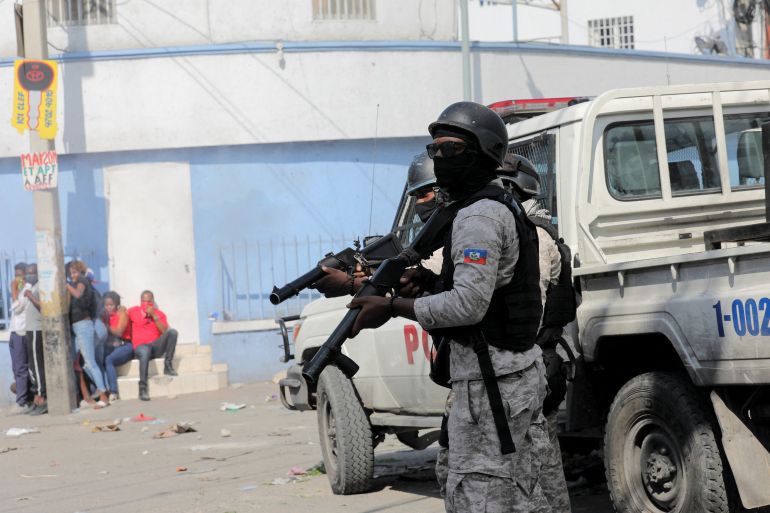Canada, US send military equipment to crisis-torn Haiti
The equipment is to help the national police to fight ‘against criminal actors’ amid a month-long turmoil.

Canada and the United States have sent “security equipment”, including tactical and armoured vehicles, to Haiti to help the country tackle a political, economic and security crisis, according to a joint statement.
“This equipment will assist the HNP [Haitian National Police] in their fight against criminal actors who are fomenting violence and disrupting the flow of critically-needed humanitarian assistance, hindering efforts to halt the spread of cholera,” read the statement released on Saturday by the two countries.
Keep reading
list of 3 itemsCould Haiti get worse?
Haitians protest against government call for foreign intervention
The Pan American Health Organization said last week that cholera is resurging in Haiti, with a rising number of confirmed and suspected cases, nearly a quarter of which are among young children. With a concentration of cases in areas where violence is escalating, making access difficult, experts warn that the real scale may be much worse than expected.
There are more than 560 suspected cases of cholera, some 300 hospitalisations and at least 35 deaths, with experts warning the numbers are likely much higher than what is being reported.
Gang violence on the rise
The security equipment arrived as Haiti, the poorest nation in the Americas, is facing political turmoil and a coalition of gangs preventing the distribution of diesel and petrol. Most transport is halted, with looting and gang shootouts becoming increasingly common.
In mid-September, gangs surrounded a key fuel terminal to demand Prime Minister Ariel Henry’s resignation and to protest a spike in petroleum prices after his administration announced it could no longer afford to subsidise fuel.
That move, coupled with thousands of protesters blocking streets in the capital of Port-au-Prince and other major cities, has caused crucial shortages, forcing hospitals to cut back on services, petrol stations to close and banks and grocery stores to restrict hours. Nearly 60 percent of Port-au-Prince, or 1.5 million people, may now be under the control of gangs, many of which have turned to sexual assault to consolidate power, according to a UN report (PDF) published on Friday.
Last week, in an attempt to quell the violence and confront the gangs, Henry asked the international community to send military assistance. His plea was joined by UN chief Antonio Guterres who called for the immediate deployment of a special armed force.
But the move sparked further outrage, with thousands of people taking to the street against the “foreign occupation”. Several people were shot and one person was reported to have been killed.
In a video posted on Facebook early this month, the leader of the so-called G9 Family and Allies gang Jimmy “Barbecue” Cherizier read a proposed plan to stabilise Haiti that includes the creation of a “Council of Sages” with one representative from each of Haiti’s 10 departments.
The gang also is demanding positions in Henry’s cabinet, according to the director of Haiti’s National Disarmament, Dismantling and Reintegration Commission, speaking to radio station Magik 9 on Thursday.
The UN Security Council is considering sanctions against Cherizier and others who threaten the peace, security or stability of Haiti, according to a draft resolution, several news outlets have reported.